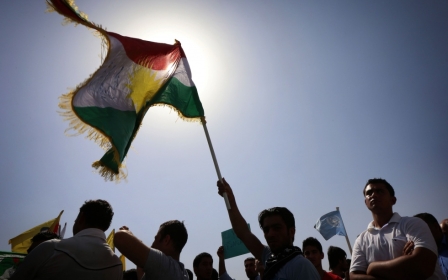Britain launches first drone strikes in Iraq against Islamic State

Britain has used its unmanned aerial drones in Iraq for the first time to strike Islamic State jihadists, the Ministry of Defence said Monday.
Over the weekend, a remotely-piloted Reaper aircraft successfully launched a missile attack on IS extremists near Baiji, north of Baghdad, where they were planting improvised explosive devices, the MoD said.
The Reaper drones have been re-deployed from Afghanistan, where Britain this month ended its combat operations after 13 years fighting the Taliban insurgency.
"A series of coalition missions were conducted near Baiji, north of Baghdad, where ISIL (Islamic State) terrorists were laying improvised explosive devices," the MoD said.
"The Reaper Remotely Piloted Air System, using procedures identical to those of manned aircraft, successfully attacked the terrorists using a Hellfire missile.
"UK Reaper continued to provide intelligence, surveillance and reconnaissance assistance to coalition aircraft which enabled them to conduct further strikes."
Reapers are remotely controlled by pilots based at the Waddington Royal Air Force base in Lincolnshire, eastern England.
The US-made drones are normally armed with two Paveway laser-guided bombs and four Hellfire missiles for precision strikes.
Britain also has eight Cyprus-based RAF Tornado fighter jets conducting bombing raids on IS targets in Iraq.
The MoD also said Monday that the Tornados last week used Brimstone precision-guided missiles to destroy IS armed pick-up trucks.
And on Sunday, an RAF aircraft destroyed a shipping container west of Baghdad.
The MoD said the container was "used by the terrorists to store equipment to support extortion and control of the local population".
Meanwhile other RAF aircraft, including tankers, transport and surveillance platforms, also continue to support coalition air operations.
Britain has provided heavy weapons to Kurdish peshmerga fighters battling IS, and training in how to use them. London however has repeatedly insisted it will not be deploying combat troops on the ground.
Stay informed with MEE's newsletters
Sign up to get the latest alerts, insights and analysis, starting with Turkey Unpacked
Middle East Eye delivers independent and unrivalled coverage and analysis of the Middle East, North Africa and beyond. To learn more about republishing this content and the associated fees, please fill out this form. More about MEE can be found here.




